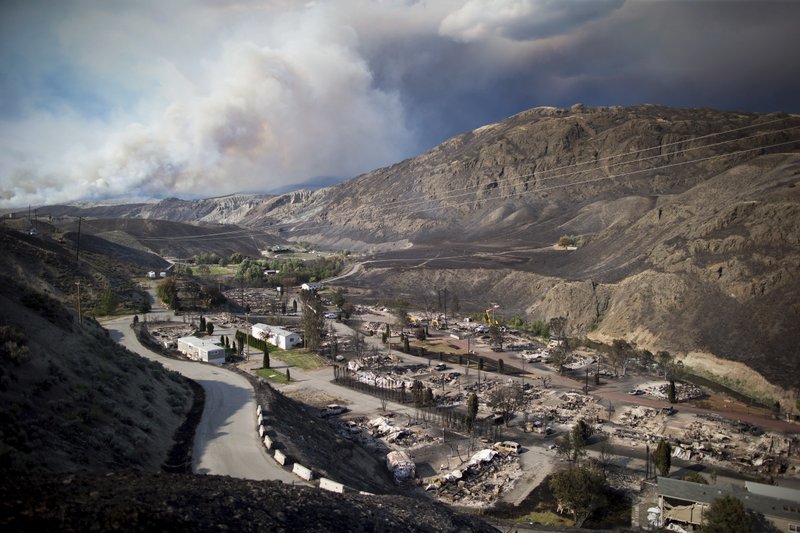OROVILLE, Calif. --Crews were making progress Monday against dozens of fires across California, Colorado, Arizona and New Mexico, and into Canada.
Authorities were hopeful some of the 4,000 evacuees from Oroville would be able to return Monday as winds diminished and firefighters working in rugged terrain extended containment lines.
When Chuck Wilsey was ordered to flee over the weekend as a wildfire roared near his ranch home in Oroville, he was ready. He started keeping his truck and camper loaded with supplies in February, when some of the heaviest winter rains on record in Northern California nearly led to catastrophic flooding below the nation's tallest dam.
"Fire and flood so close together," he marveled on Monday at a Red Cross shelter. "We just try to stay prepared,"
Wilsey, 53, and his family were among the about 4,000 people evacuated as flames raced through grassy foothills in the Sierra Nevada, about 60 mile north of Sacramento. Sheriff's deputies drove through neighborhoods announcing evacuation orders over loudspeakers.
Wilsey returned to his ranch home on Monday, relieved to learn it had been spared by the wildfire.
The blaze burned nearly 9 square miles of grass, injured four firefighters and destroyed at least 17 structures. It was 35 percent contained.
The area burning is southeast of Oroville, near where 200,000 residents downstream from the 770-foot-high Oroville Dam were briefly evacuated in February when the structure's spillways began crumbling.
California fire officials warned residents in wildfire areas to get out immediately if authorities issue evacuation orders.
Bennet Milloy, spokesman for the state's Department of Forestry and Fire Protection, said Monday that officials had to send in three engine crews to rescue a person who ignored weekend orders to leave as flames approached mountain homes. Milloy said officials will always try to save human lives, but the effort can sometimes drain resources needed elsewhere. He noted that three engines can protect up to 20 homes.
In Southern California, at least 3,500 people remained out of their homes as a pair of fires raged at different ends of Santa Barbara County. The larger of the two charred more than 45 square miles of dry brush and threatened more than 130 rural homes.
The fires broke out during a blistering weekend heat wave that toppled temperature records. Slightly cooler weather is expected to give crews a break in the coming days.
Also on Monday, a spokesman said the U.S. Forest Service repaid most of the $18 million that a California official said it owed the state for fighting fires last year.
About $14 million was paid to local governments by the end of June and the Forest Service was trying to resolve differences over the remaining sum, which included administrative costs that may not be reimbursable, Paul Wade said.
California Emergency Services Director Mark Ghilarducci sent a sharply worded letter to the forest chief last week saying the federal government had lagged behind in repaying firefighters on time and that the state might stop responding to fires in national forests.
In Colorado, crews were winding down the fight against a wildfire that temporarily forced the evacuation of hundreds of people near the resort town of Breckenridge. Firefighters built containment lines around at least 85 percent of the blaze.
In Arizona, rain helped firefighters working a wildfire in mountains overlooking Tucson while also creating unsafe conditions for the crews.
Fire management officials say monsoon rains "hit the bull's-eye" Sunday, dropping more than 1 inch of rain in one area of the Santa Catalina Mountains. However, the rain also caused flooding and washed out roads and was accompanied by lightning, forcing firefighters to pause their work.
In Montana, crews were gaining the upper hand on a fire burning south of the Fort Belknap Indian Reservation.
In the north-central part of the state fire has burned more than 16 square miles in the Little Rocky Mountains and has threatened the surrounding towns of Zortman, Landusky, Hays and Lodgepole.
Information for this article was contributed by Christopher Weber and Brian Melley of The Associated Press.
A Section on 07/11/2017
